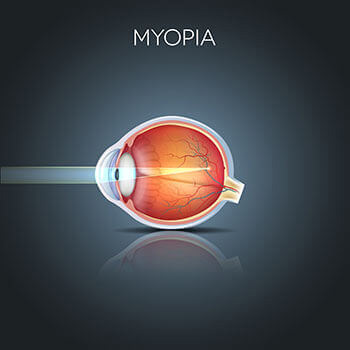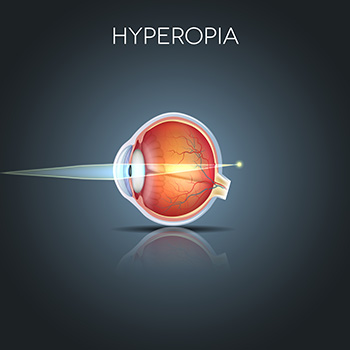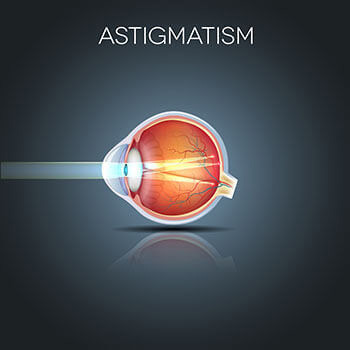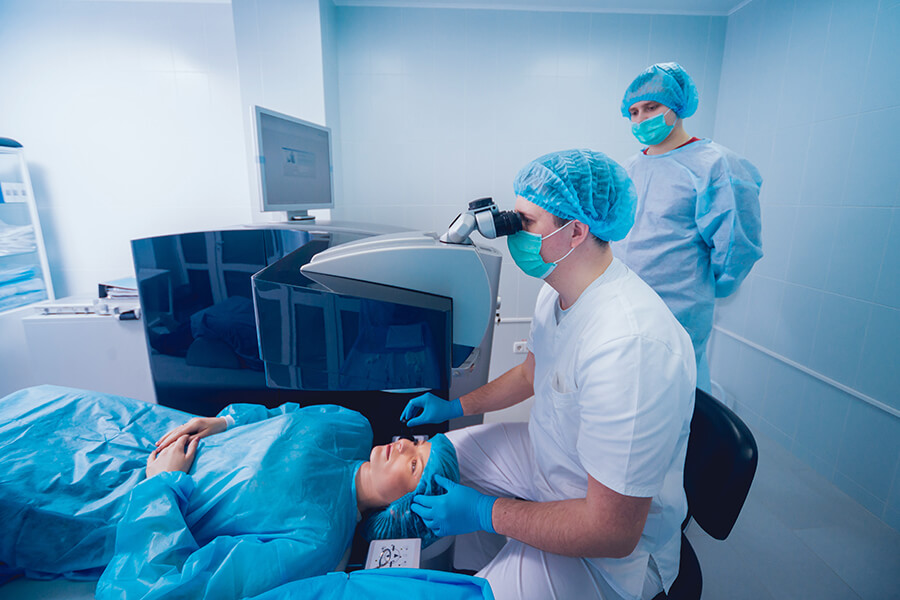Vision Correction
What Types of Vision Problems Does Refractive Surgery Correct?
Refractive eye surgery can improve your vision and decrease or eliminate your need for contact lenses or glasses. These surgeries are optional and many people in the Las Vegas, Nevada area choose them to make their lives more convenient and eliminate the ongoing expenses that come with using glasses or contacts. Here’s some more information about refractive surgery and some of the vision problems it can correct.
Types of Refractive Surgery
Before you see a doctor, it’s a good idea to learn more about what refractive surgery involves. Here are some of the most common types of refractive surgery:
LASIK
LASIK or laser-assisted in-situ keratomileusis is one of the most popular options. Doctors use a laser to create a thin flap in the surface of the cornea. The cornea is a clear protective film that covers the lens and defends many other parts of the eye. It also bends or refracts incoming light, helping you focus on objects. After removing some of the tissue underneath the flap on the cornea, the surgeon returns it to its original position. The procedure only takes about 15 minutes and a computer helps the doctor decide exactly how much corneal tissue to remove.
You could experience dry eyes or reduced night vision for up to three months after the procedure. LASIK isn’t usually recommended for athletes because a blow to the eye could dislodge the flap before it fully heals.
PRK
During a PRK or photorefractive keratectomy, the surgeon removes the first layer of the cornea instead of creating a flap. Then, a laser reshapes the cornea and the surgeon places a special contact lens over it to act as a bandage. This procedure is simpler and has fewer potential side effects than LASIK, but you could have blurry vision for up to three months while the outer layer of the cornea grows back.
ICL
People with severe vision problems or thin corneas can get an ICL or implantable collamer lens. It goes over the natural lens and behind the iris and it works like a permanent contact lens. No maintenance is needed to keep it in good condition. The surgery is fully reversible, but most people who get the implant never have it removed.
Many people who get an ICL report better vision than they had with glasses or contacts. Studies show that more than half of patients have 20/20 vision or better several years after surgery. This permanent contact lens even has a UV blocker that can help keep harmful light from entering your eye.
No matter which procedure you choose, you’ll need to use antibiotic eye drops to prevent an infection after surgery. The FDA has approved LASIK and PRK for people over 18 and people who get an ICL must be between 21 and 45. While these procedures often provide drastic vision improvements, they may not completely eliminate the need for glasses or contacts in all patients.
Types of Vision Problems Refractive Surgery Can Correct
Nearsightedness (Myopia)

Nearsightedness, also called myopia, is when the cornea curves outward too much. People with nearsightedness may have trouble seeing objects that are far away. They often have difficulty reading road signs while driving and seeing the board clearly while attending classes. They may experience eye strain and headaches. People can be nearsighted in one or both eyes. Nearsightedness in both eyes is called bilateral myopia.
Nearsightedness can have a variety of causes. In some people, the collagen fibers in the cornea weaken over time and cause a change in shape. This is called keratoconus and it usually starts in teenagers. However, some people can get it when they’re older or younger. Doctors aren’t sure what causes it, but it may be at least partially hereditary. It could also be a result of inflammation from allergies, asthma, or an infection. Rubbing your eyes hard frequently can damage your corneas as well.
Refractive surgery can help reduce the curvature of the cornea, letting you focus on faraway objects without glasses or contacts. Your doctor may recommend LASIK, PRK, or ICL surgery.
Farsightedness (Hyperopia)

Farsightedness is also called hyperopia and it happens when the cornea is too flat. People with farsightedness often have trouble focusing on objects close to them. They may find reading fine print, sewing, and similar activities difficult. They can also get headaches and eye pain. Children are often farsighted, but the condition usually goes away as they get older. Like nearsightedness, farsightedness can sometimes be hereditary. It’s common in older people and it can become worse as you age.
LASIK or PRK can correct minor cases of farsightedness by increasing the curvature of the cornea, but doctors often recommend ICLs for more severe cases. In some cases, you may need a combination of LASIK or PRK and an ICL. If your farsightedness is related to aging, it could come back several years after surgery. You may need to repeat the procedure or get a different type of refractive surgery.
Astigmatism

With astigmatism, the curvature of the cornea is irregular. This can cause blurry or distorted vision, headaches, and poor night vision. People with astigmatism often have nearsightedness or farsightedness as well. Experts aren’t sure exactly what causes astigmatism. Some people are born with it and it develops in others as they get older. It can also happen after an infection or an injury to the eye. LASIK can correct astigmatism by smoothing the irregularly shaped parts of the cornea.
An astigmatic keratotomy or AK is similar to a PRK, and an ICL works like a permanent contact lens. Some patients with minor astigmatism can get limbal relaxing incisions or LRIs that are less complex than LASIK or an AK. The surgeon makes one or two small incisions near the edge of the cornea to improve its shape. Like farsightedness, more severe cases of astigmatism may require a combination of treatments.
To find out if refractive surgery is a good option for you or to schedule an appointment with an experienced surgeon, contact us at NV Eye Surgery. We offer a variety of advanced surgical procedures and we can help you improve your sight and your quality of life.








